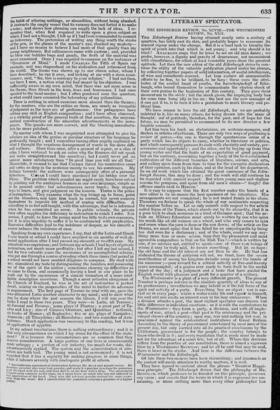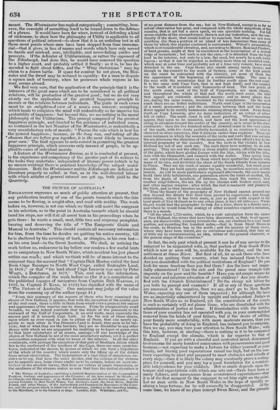THE EDINBURGH REVIEW, No. XCVIII.—THE WESTMINSTER REVIEW, No. XXII.
LITERARY SPECTATOR.
THE Edinburgh Review having attained nearly unto a century of quarters, has lately cast its skin, and probably hopes to reassume its ancient vigour under the change. But it is a hard task to breathe the spirit of youth into that which is not young; and why should it be tried ? ANACREON sings that he loves to see an old man dance ; we prefer, however, a dignity and gravity of demeanour, not inconsistent with cheerfulness, for which at least venerable years show the greatest aptitude. Let then the new editor of the old Edinburgh strive to con- tinue the utility of the valuable publication placed under his charge, by collecting together papers of solid information, of useful intelligence, of wise and considerate counsel. Let him eschew all unseasonable efforts to be fine, to be brilliant, to be fiery : these were the attri- butes of the cordial band of youths, the burschenfsciwft of Edin- burgh, who bound themselves to communicate the electric shock of their own genius to the beginning of this century. They gave their. momentum to the sidcle ; but the shock given, the impinging body has for some time hung idly in the air : the best use the new manager of it can put it to, is to turn it into a pendulum to mark literary and po- litical time.
We have reason to love the old Edinburgh, for we are probably indebted to it, like so many others, for being drawn into the maze of thought : out of gratitude, therefore, for the past, and of hope for the future, we may be permitted to recommend to its new director a few- humble counsels.
Let him turn his back on rhetoricians, on sentence-mongers, and dealers in articles of criticism. There are only two ways of producing a review of power,—the one is through the spontaneous union of a party which has its objects to carry, whether in literature or politics, and which consequently pursues its ends with elasticity and variety, per- severance and opportunity : and the other, not by buying up from this young writer and that the fruits of an expectation of good payment, but on the contrary. associating together a body of the best-established cultivators of the different branches of literature, science, and arts, and calling upon them from time to time for the energetic declaration of their opinions, each in his class, and at the head of his department. In an old work which has attained the great eminence of the Edin- burgh Review, this may be done ; and the work will still continue to be regarded with ancient respect. But when 'young men and shallow assume the pompous, and spout from old men s chairs—" faugh! the offence smells rank to Heaven."
It is easy to suppose that the first number under the hands of a new editor is by no means the best specimen of his intentions. His arrangements are not completed ; he is not seated firmly in his chair. Therefore we forbear to speak the whole of our sentiments respecting the number before us. Let us only remark with respect to the article called Signs of the Tinies, which stands out by its absurdity, that it is a poor trick to cloak nonsense in a kind of,German mist ; that the ar- ticle on Military Education must surely be written by one who spins his words like an old woman on a wheel, and who only ceases to spin and croon when the yarn is done or the sun down; of the article on the Drama, we must opine that it has failed for an encyclopaedia by being too dull even for a dictionary; and of the whole, could we say any- thing more true or more severe, than that the pleasantest and most agreeable composition is that on the Malt Tax?—which is written by one, if we mistake not, entitled to speak—one of those rare beings of whom it may be truly said, he knows something. But let us hope : the old fame and the old interest are not thus to die. He that has abdicated the throne of criticism will not, we trust, have the severe mortification of seeing his kingdom dwindle away under the hands of his successor ;—poor reward for a critical activity of five-and-twenty years unexampled; of a genius ever ready to turn itself to the useful object of the day; of a judgment and a taste that have guided the English world with pleasure and profit for a quarter of a century. The Westminster is a plant of a very different growth. The present Number is perhaps inferior in the absolute quantity of ideas to any of its predecessors ; nevertheless we may behold in it the full force of the spirit and activity of a party. Everything has an object : war is car- ried on in every page: where a writer wants life and vigour in himself, his end and aim excite an interest even in his lazy endeavours. When a division attacks a post, the most vigilant spectator can discern but little difference in individual exertions : so it is with the contributors to the Westminster they form a party, a division, and with all imple- ments of war, attack a post—that post is the aristocracy and the pri- vileged classes of the country ; open war, war and nothing but war, is proclaimed against the aristocratical institutions of Great Britain. According to the theory of government entertained by most men of the present day, but only carried into all its practical conclusions by the Utilitarians, government is for the people ; the country belongs to those who dwell. in it ; and every regulation that is made must be made not for the advantage of a select few, but of all. Where this doctrine differs from the practice of our constitution, there is aimed a vigorous blow by a 'Westminster Reviewer; and let all be said that may be said, there is heart in the stroke. And here is the difference between the Westminster and the Edinburgh.
Of late these two reviews have been skirmishing; and inasmuch as the contest will excite attention to worthy matters, it is well.
They have agreed to contend about the phrase " Greatest Happi- ness principle. ' The Edinburgh denies that the philosophy of Mr. BENTHAM, which professes to be founded on this principle, possesses any value ; and asserts that the terms in which it is expressed are un- meaning, or mean nothing more than every other philosopher lids meant. The Westminster has replied categorically ; committing, how- ever, the oversight of permitting itself to be bound down to the defence of a phrase. It would have been far wiser, instead of defending a kind of nickname, to show how the philosophy of Utility is applicable to all questions of political interest—to show that it is an unfailing test in all those moot points where men have been stopped from time immemo- rial—that it gives, in lieu of names and words which have only served to dazzle and mislead, sure, intelligible, and never-failing guides and precepts. If the defender of Utilitarianism, or rather the opponent of the Edinburgh, had done this, he would have removed the question to a higher court, and probably settled it finally: as it is, he has de- scended to fight about trifles, and the " Whig rhetorician " may lay claim to a drawn battle. If space for combat be not given, the Her- cules and the dwarf may be reduced to equality : for a man to dispute a square inch of territory, when he possesses whole regions in his rear, seems absurd.
We feel very sure, that the application of the principle that it is the interest s of the great mass which are to be considered in all political relations, will be productive of the greatest good ; but we do not very clearly see the application of the greatest happiness principle to morals or the relations between individuals. The guide in such cases must be an enlightened view of a man's own interest : everything which tends to enlighten the mind will undoubtedly so far improve his probability of happiness : but beyond this, we see nothing in the moral philosophy of the Utilitarians. The precept composed of the greatest happiness principle, and directed to the guidance of individual cases, as contained in the last Number of the Westminster, is undoubtedly a very unsatisfactory rule of morals: " Pursue the rule which is best for the general happiness ; because, in the long run, and taking all the chances that are before you together, it is the most likely to increase your own." The fault appears to us to consist in permitting the greatest happiness principle, which concerns only masses of people, to be ap- plied to cases of individual morals.
A feature of the Westminster Review, as it is conducted at present, is the experience and competency of the greater part of its writers to the tasks they undertake: independent of literary power (which is by no means wanting) there is practical knowledge of the subject under discussion. Both the Westminster and the Edinburgh are deficient in literature properly so called: in that, as in the well-directed labour with which articles of general interest are got up, both yield to the Quarterly.



















 Previous page
Previous page